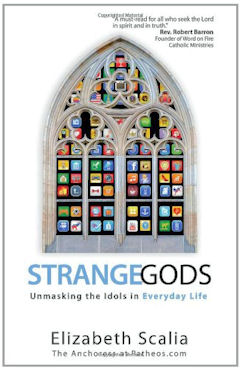
|
Posted October 15, 2013
Book: Strange Gods: Unmasking the idols in everyday life Author: Elizabeth Scalia: The Anchoress at Patheos.com Ave Maria Press. Notre Dame, IN. 2013. Pp. 168 An Excerpt from the Introduction:
So, welcome to an adventure of discovery that may afford you the satisfaction of some deconstruction. When my kids were little, the liked nothing better than to kick over the very blocks they had carefully, cunningly erected. We will do something like that in these pages, hopefully to great, path-clearing effect. It is my sincere wish that by identifying our idols for what they are, we can begin removing them from all the high places we have allowed them to be enshrined --- before our eyes, in our hearts, between each other, and between God and us. In that way, we can begin to embrace the fullness of understanding that has been designed for us since Eden, covenanted to us through Moses and Christ, and awaits our reclamation. An Excerpt from the Book: "How can one man have so much stuff? Why did he need all of this?" The answer, I thought then and still think now, was that there was a void in his life he could not fill on his own, no matter how much material stuff he threw into it. Although he had many friends and was dearly loved by the whole family, there was an emptiness that had gone unanswered. He was a victim of the exact spiritual poverty Blessed Teresa described. He was a privileged member of the community whose extras, as Saint Benedict taught, were only evidence of the depths of his need and his entrapment by all he possessed. It reminded me a bit of the famous quote by Dostoyevsky in The Brothers Karamazov: The world says, "You have needs, therefore satisfy them, for you have the same rights as the richest and noblest men. Do not be afraid to satisfy them, but even increase them" --- this is the current teaching of the world. And in this they see freedom. But what comes of this right to increase one's need? For the rich, isolation and spiritual suicide; for the poor, envy and murder. . . . It is simplicity that brings real freedom. As a Benedictine nun at Abbaye Notre Dame l'Annonciation put it, "I really loved clothes! But there's freedom in wearing my habit." There is freedom in what is simple; having less leaves room for something much greater. The world tells us to want more and more, and praises us when we acquire it. It holds us up as winners of life's lottery and of the American Dream. But when the possessions get in the way of our ability to develop a living relationship with God, we have lost a great deal to these empty, pretty idols of prosperity, which we have allowed to stand before him. Prosperity is not evil in itself and of itself. A wealthy nation is one that can respond quickly and effectively to help another nation in crisis. A wealthy philanthropist can do a great deal of good for others. It was the wealthy Joseph of Arimathea who had the coin, the connections and the clout to have Jesus' tortured body removed from the cross, shrouded in fine linen, and entombed before the Sabbath. All of this was essential to the Resurrection. But prosperity can be a fast and powerful vehicle for driving us away from what Christ had told us is essential --- which does not include getting rich. Then he told them a parable. "There was a rich man whose land produced a bountiful harvest. He asked himself, "What shall I do, for I do not have space to store my harvest? And he said, "this is what I shall do: I shall tear down my barns and build larger ones. There I shall store all my grain and other goods and I shall say to myself, "Now as for you, you have so many good things stored up for many years, rest, eat, drink, be merry!" But God said to him, "You fool, this night your life will be demanded of you; and the things you have prepared, to whom will they belong?" Thus will it be for the one who stores up treasure for himself but is not rich in what matters to God. Table of Contents: 1. God before us 2. God after us: the idol of I 3. The idol of the idea 4. The idol of prosperity 5. The idol of technology 6. The idols of coolness and sex 7. The idol of plans 8. The super idols 9. Through the looking glass: super idols and language 10. The people of God 11. Conclusion: my dreadful idol |
|
